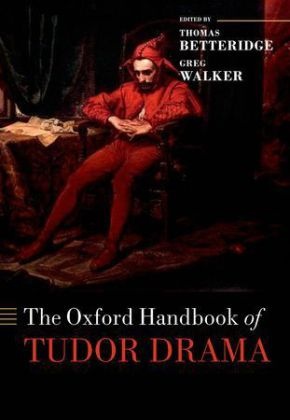Ulteriori informazioni
Zusatztext The book is essential for students of English Renaissance drama and experienced scholars will also find ground-breaking material here. Informationen zum Autor Thomas Betteridge is Professor of English Literature and Drama at Oxford Brookes University. His books include Tudor Histories of the English Reformations (1999), Literature and Politics in the English Reformation (2004) and Shakespearean Fantasy and Politics (2005). He is currently working on a study of Sir Thomas More's writing to be published by Notre Dame Press 2012. Professor Betteridge was project leader of the Arts and Humanities Research Council funded research project Staging the Henrician Court and the Wellcome Trust funded project Medicine, Birth and Death at the Tudor Court. Greg Walker is Regius Professor of Rhetoric and English Literature at the University of Edinburgh and Head of the School of Literatures, Languages and Cultures, having previously been the University's Masson Professor of English Literature. He is a Fellow of the Royal Historical Society, The English Association and the Society of Antiquaries. Greg's research is primarily focused on the literary and political history of the late medieval period and the sixteenth century, although he has also published on modern popular music and the films of Alexander Korda. He is interested in the history of the stage, and in the cultural consequences of the Henrician Reformation. His most recent books are Writing under Tyranny: English Literature and the Henrician Reformation (OUP, 2005) and The Oxford Handbook of Medieval Literature in English (OUP, 2010), co-edited with Elaine Treharne. Klappentext The first comprehensive study of Tudor drama; an invaluable account of current scholarship and an introduction to the complexity of the form. Zusammenfassung The Oxford Handbook to Tudor Drama is the authoritative secondary text on Tudor drama. It both integrates recent important research across different disciplines and periods and sets a new agenda for the future study of Tudor drama, questioning a number of the central assumptions of previous studies. Balancing the interests and concerns of scholars in theatre history, drama, and literary studies, its scope reflects the broad reach of Tudor drama as a subject, inviting readers to see the Tudor century as a whole, rather than made up of artificial and misleading divisions between 'medieval' and 'renaissance', religious and secular, pre- and post-Shakespeare. The contributors, both the established leaders in their fields and the brightest young scholars, attend to the contexts, intellectual, theatrical and historical within which drama was written, produced and staged in this period, and ask us to consider afresh this most vital and complex of periods in theatre history. The book is divided into four sections: Religious Drama; Interludes and Comedies, Entertainments, Masques, and Royal Entries; and Histories and political dramas. Inhaltsverzeichnis Introduction: 'When Lyberte ruled': Tudor Drama 1485 - 1603 Religious Drama 1: Sheila Christie: The Chester Cycle: Creation and Old Testament Plays 2: Greg Walker: The York Creation Pageant 3: Elisabeth Dutton: The Croxton Play of the Sacrament 4: Vincent Gillespie: The Digby Plays - Mary Magdalene and Wisdom 5: Andrew Hadfield: Everyman, c.1516 6: James Simpson: The Three Laws, John Bale, 1538 7: Andreas Hoefele: Christus Triumphans, John Foxe, 1556 8: Anna Rhiel: The Conflict of Conscience, 1572 9: David Lawton: Dr Faustus, Christopher Marlowe, 1588? Interludes and Comedies 10: Clare Wright: Fulgens and Lucrece, Henry Medwall, 1497 11: Daniel Wakelin: Gentleness and Nobility, John Rastell, c.1529 12: Pam King: The Play of the Weather, John Heywood, 1529-33 13: Meg Twycross: Wit and Science, John Redford, 1539-47 14: John J McGavin: Nice Wanton, 1550 15: Jane Griffiths: Lusty Juv...

